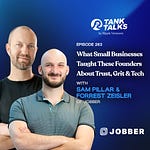Today we're diving into the world of ProductLed growth and user onboarding strategies with our special guest, Adam Jarczyn, Senior Director of Product Digital Health at PC Health and a valued Venture Partner at Ripple.
Adam brings a wealth of experience to the product and go-to-market strategies for early-stage startups and offers unique insights that help founders scale revenue and retention.
In our conversation, we covered a range of topics, including scoping and discovery core features that can drive significant gains without losing sight of the project's vision, decision Velocity and how to cultivate a culture that values quick and smaller decisions, how urgency shapes PLG strategies and user experiences, and how tailoring your company's onboarding experiences can help address some of the most common PLG challenges.
About Adam Jarczyn:
Adam Jarczyn works as Senior Director of Product Digital Health at PC Health, while also being a Venture Partner at Ripple Ventures, a ProductLed Coach at ProductLed, and a GTMramp Member at GTMfund, where he advises and invests in companies that leverage product-led growth (PLG) and user onboarding strategies to scale their revenue and retention.
He has been a founder and operator at KOHO, Shopify, Slyce and others. He holds a BS and MBA from McMaster University.
(0:58) Discussing his career journey, Adam highlights transitions from product-focused roles to operational and go-to-market strategies.
(1:41) Reflections on early career experiences include a startup exit and a shift to more operational roles.
(1:58) The path into product-led growth (PLG) is described, emphasizing how diverse experiences influenced his understanding of product functions.
(2:29) Emphasizing the importance of learning from successes and mistakes, Adam underlines this as a key factor for growth.
(3:16) Insights from his tenure at Shopify focus on team dynamics and balancing growth with capacity.
(4:46) Importance of compromise and autonomy in diverse problem-solving environments is stressed.
(5:49) A problem-solving approach that starts with low-fidelity solutions, scaling up based on success, is explained.
(7:35) The early mindset of "the best idea wins" has evolved to prioritize effective problem-solving.
(9:07) Focusing on understanding user problems, Adam discusses finding solutions through systematic approaches.
(10:36) Advocating for human-led or low-fidelity initial solutions, the emphasis is on minimizing scope in technology projects.
(11:12) The advantages for early-stage companies in closely interacting with their users are discussed.
(12:34) Advice for early-stage entrepreneurs centers on understanding customer needs and fostering a culture of quick decision-making.
(14:28) Prioritizing user interactions and feedback over rapid scaling is highlighted as significant for early-stage companies.
(15:58) In discussing product-led growth, understanding customer behavior and preferences is emphasized.
(17:28) The role of human interaction in enhancing user experiences within product-led growth strategies is elaborated.
(19:28) Balancing product improvement, marketing, and human interaction is advised for addressing user challenges effectively.
(22:20) Integration of human elements in product-led growth strategies, especially in customer interactions, is suggested for early-stage teams.
(22:43) Direct communication with users and building personal relationships are cited as advantages for early-stage companies.
(24:02) A balanced approach between comprehensive data collection and practical action is advocated for data-driven decision making.
(25:56) Focusing on key metrics and adapting data collection strategies based on evolving needs is encouraged.
(27:05) To understand user drop-offs, focusing on positioning and value proposition is suggested when user interaction data is low.
(29:03) Narrowing focus on solving specific user problems is advised for early-stage teams to avoid premature scope broadening.
(31:57) Narrowing focus on specific user segments is recommended for more effective problem-solving and marketing for early-stage startups.
(34:03) Focusing on user problems without rushing into monetization is emphasized as crucial in early venture stages.
(36:57) Learning from sales organizations about managing leading and lagging indicators is advised for product teams.
(39:51) Bold experimentation in AB testing is advocated over cautious approaches.
(41:38) Quick feedback cycles are emphasized as vital for product innovation, suggesting a focus on leading indicators.
(43:58) Incorporating multidisciplinary thinking and cross-team collaboration to solve user problems is recommended.
(45:18) Challenges in incorporating new market dynamics into product decision-making are discussed, underlining the value of small-scale experiments.
Fast Favorites:
🎙- Favorite Podcast: The Daily
📰- Favorite Newsletter / Blog: All In Manager
📲- Favorite Tech Gadget: Dexcom G7
📈- Favorite New Trend: Gentle Parenting
📚- Favorite Book: The Subtle Art of Not Giving a Fuck
🤔 - Favorite Life Lesson: When you're 14, you think everyone cares about you. When you're 40, you stop caring what everyone thinks. And when you're 60, you realize no one cared about you in the first place.
Follow Matt Cohen and Tank Talks here!














Share this post